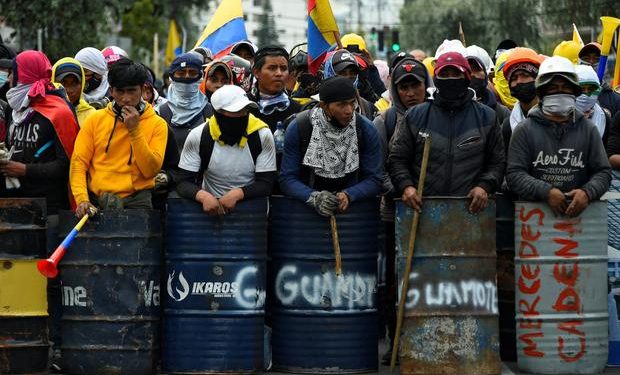PHOTO: Indigenous people with shields unite before marching in the El Arbolito park area in Quito, Ecuador, on 22 June 2022, on the tenth consecutive day of indigenous-led protests against the government of Guillermo Lasso. (RODRIGO BUENDIA / AFP).
By International Workers’ Unity – Fourth International
For 10 days, a national strike with road blockades and huge demonstrations has been shaking Ecuador. The liberal and pro-imperialist bosses’ government of Lasso has responded with violent repression.
The National Indigenous Organisation of Ecuador (Conaie) called for a general strike and road blockades from Monday 13 June. This call was supported by student and neighbourhood organisations, the National Union of Educators and the United Workers Front (FUT).
Tens of thousands of indigenous people, workers and popular sectors take to the streets in the capital Quito, Guayaquil and other cities against the government of Lasso, against his economic and repressive measures. The political organisation Somos Agua (We Are Water), headed by Yaku Perez, also expressed its support for the popular protest and repudiated the repression. They took part in the marches.
The event that sparked the protests was, as in the popular indigenous rebellion of 2019, the fuel increase of over 50 per cent. Domestic fuel prices are “liberated” (they increase non-stop) by the order of the IMF. Although Ecuador is an oil-producing and exporting country and imports a minor part of the gasoline and petrol it needs.
The country is experiencing an economic crisis, with an increase in prices for basic needs products. This is worsening with the impact of plundering and polluting mining, at the hands of transnationals, which are destroying forests and water sources. An entire plan of plundering with an increase in poverty, defunding of health and education, unemployment, labour precariousness and informality, poverty salaries in a country that no longer has its own currency, and where prices and salaries are in dollars. And also a social crisis with mafias controlling drug trafficking, and an increase in violence in prisons with 400 deaths in a year and a half.
As in other Latin American countries, the government of the banker Guillermo Lasso obeys the orders of the IMF to pay the foreign debt and preserve the profits of businessmen, bankers and multinationals, and unloads the crisis on the working people.
To impose this policy, it implemented repressive measures, such as a recent “Law on the Legitimate Use of Violence” that was even approved in the National Assembly (where Lasso is in the minority) with the support of the fake left-wing Correista opposition, which allows military repression and even the use of firearms to repress popular protests that the government calls “terrorism”.
During the last 10 days of demonstrations, 4 demonstrators were killed by the violent police repression. There are over 100 injured and hundreds of prisoners, including some accused of being “terrorists” since before the demonstrations. Leonidas Iza, the leader of Conaie, was also detained for one day.
The marches and blockades demand a reduction in fuel prices. Other demands are to reduce food prices, which have risen out of all proportion, and effective control of speculators; no to the plundering mining of the multinationals that destroy nature; not to the privatisation of state companies; a one-year moratorium on the financial system so that families can pay their debts; fair prices for rural products; employment and labour rights; no to mining in indigenous territories and water sources; not to the privatisation of strategic sectors; an urgent increase in the budget for health and education; free access to public universities; no more indebtedness; no to the payment of the foreign debt. There are also demands against repressive laws and for the release of those imprisoned for fighting. In the street protests, the slogans “We want all in power Out” and “Out with Lasso, out!
The Ecuadorian working-class and indigenous people staged powerful rebellions led by the Conaie in 1997, 2002 and 2005, overthrowing three governments. In 2019, there was another great uprising that forced the government of Lenin Moreno (Rafael Correa’s former vice-president) to repeal the fuel increase. Quito was occupied by the indigenous uprising for ten days.
In order to win and achieve fundamental changes to solve the economic disaster that the people are experiencing, which were not achieved in previous popular rebellions, it is urgent to unify and coordinate this powerful mobilisation of the working people. It is necessary to unite the organisations in struggle and draw up a common programme of workers, popular, indigenous and students’ demands, and an economic plan to achieve them. In this sense, Ecuador has the important tradition of the People’s Parliament, which, with representatives of the indigenous, popular and workers’ organisations, has met with political crises, such as in 2005 and 2019. It is necessary to promote from the grassroots, from the Conaie, the FUT, the UNE, student organisations, and other organisations in struggle, the demand to the leaders to reach this unity, convene the People’s Parliament, and plan a program to throw out the government of Lasso and the IMF, and to govern Ecuador with the working and indigenous people.
From the International Workers’ Unity – Fourth International (IWU-FI) we give our unconditional support and call for international solidarity with the rebellion of the Ecuadorian working and indigenous people.













